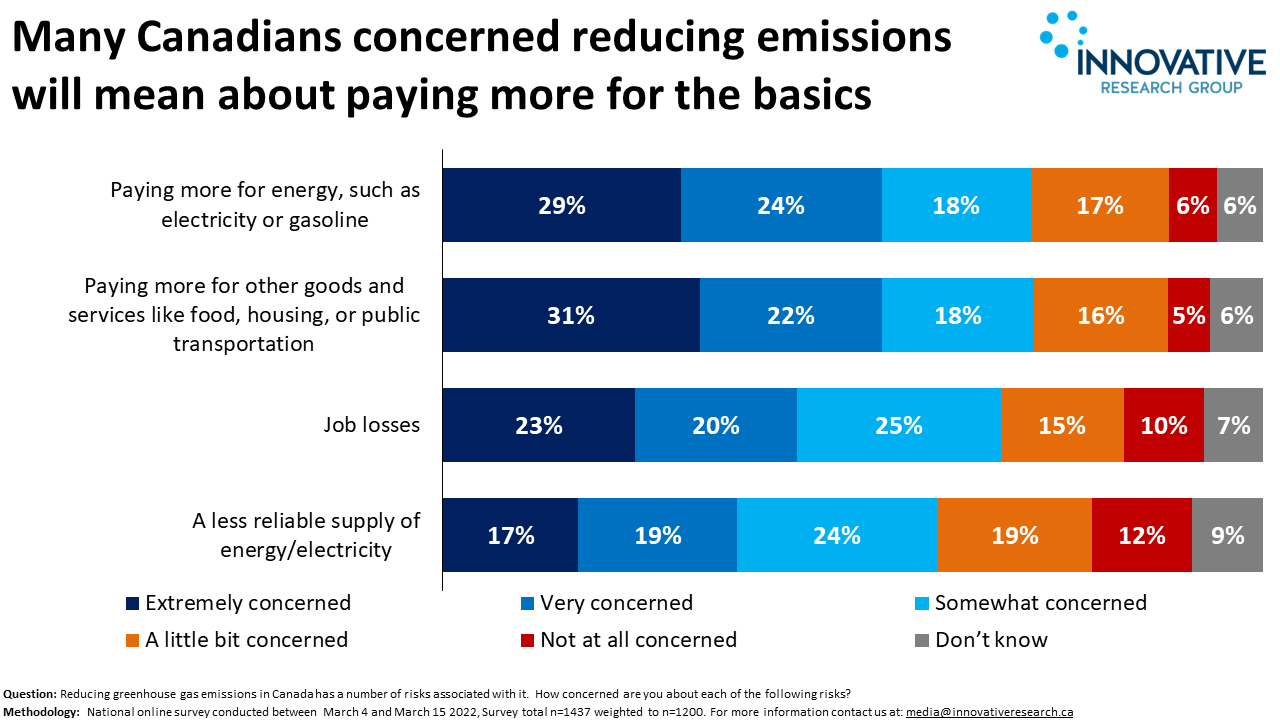
Canadian attitudes towards the energy transition have shifted in recent months, though the appetite for climate leadership remains. The findings come a recent INNOVATIVE online survey of 1437 Canadian residents, weighted to 1200, conducted from March 4 to 15, 2022. A full methodology is provided in the appendix.
An issue in flux
There is an elite conversation going on where terms like net zero, carbon neutral, decarbonization and energy transition are household words. But many average Canadians are not engaged in that discussion. While 87% are at least somewhat familiar with the concept of climate change, only 55% are generally familiar with the idea of energy transition and just 46% are familiar with idea of electrification. When people are not engaged in an issue, there is always potential for significant changes in key attitudes. And that is happening now on climate change and energy transition.
Beliefs and attitudes
There is a mix of continuity and change when it comes to climate change and energy transition. Belief in climate change and support for climate action in the abstract remains strong.
Almost 9-in-10 Canadians still hold the view that climate change is at least probably occurring (89%), while almost 2-in-3 Canadians agree that Canada should be a leader in reducing greenhouse gas emissions even if other countries are not keeping up (64%; net agreement +46%). In addition, 1-in-2 Canadians say they are comfortable with job losses or paying more for energy in order to reduce emissions as fast as possible.
However, for many people, the energy transition is a more a complex issue. Many have conflicting views, both agreeing with the need to transition away from fossil fuels yet supporting the ongoing production and export of Canadian fossil fuels.
To help make sense of these conflicting views, INNOVATIVE has grouped respondents that share similar energy transition responses into 5 clusters. Overall, 44% are at least somewhat more supportive of the transition, down from a peak of 49% in December 2020. 38% are at least somewhat more supportive of oil and gas, up from a low of 32% in December 2020. About 1-in-5 Canadians consistently express conflicted views about the transition (19% in the latest wave).


A key area where we are seeing significant attitude changes is on energy transition. One of the biggest shifts in the tracking is a eight-point decline from 50% to 42% in agreement that “The world is facing a climate emergency and it is irresponsible for Canada to add to the problem by developing new oil and gas projects”. And there is a six-point increase from 45% to 51% in those who agree it makes no sense to leave Canadian oil and gas in the ground.
Costs a concern
Another key change is the rising concern about affordability. The cost of living is by far the top concern among Canadians, and this appears to be driving concerns over the energy transition.
A majority are concerned that a shift from fossil fuels to electricity will result in bigger bills with little benefit to the climate (net +36%). Strong majorities are at least somewhat concerned that reducing emissions will result in paying more for energy (72%) and food, housing and public transportation (72%).

Electrification
While Canadians are concerned about the cost of electrification, a majority (54%) agree that individual choices to switch from fossil fuels to electricity can make an important difference. But there is still a lot of uncertainty about the role of electrification in tackling climate change with just 43% seeing it as key with 38% uncertain.
Carbon tax
Another important change is declining support for the federal government’s carbon tax, which now stands at its lowest level since July 2018. Just 15% say they strongly support the policy and another 23% say they somewhat support it. Strong opposition to the policy (20%) is higher than recent waves but still not as high at it was in 2018 (25%).

The single biggest caution for energy transition supporters comes from tracking competing carbon tax narratives. Given a choice between the two narratives, just 38% now chose “Putting a price on pollution is one of the best ways to lower carbon consumption and fight climate change in this country.” This is down from a peak of 46%. Meanwhile 45% chose “The carbon pricing policy is just another tax grab that hinders economic development of the country and does nothing for the economy.”
That is re-enforced by the public reaction to a call to postpone further increases to the carbon tax. A plurality also say they would support a pause on increases to the carbon tax, which increased from $40 tonne to $50 per tonne on April 1. Support for the pause was highest in Alberta and the Prairies (56%) and Atlantic Canada (53%).
Political Implications
While there is growing skepticism towards the current policy framework, there are political risks for the Conservatives in embracing the skeptical point of view. INNOVATIVE asked respondents to assess how committed each party is to addressing climate change. Just 29% say the Conservatives are even somewhat committed. Getting behind the growing wave of skepticism towards Canada’s current climate policies could result in the Conservatives digging a deeper credibility hole, winning the battle but losing the war on the issue.
Summary
The discussion of climate change among elites and within the broader are starting to diverge. While energy transition is not necessarily a zero-sum game, anxiety is rising over the cost of living at the same time views are becoming more supportive of traditional oil and gas activity. While the vast majority of Canadians see climate change is a serious problem, the consensus on how best to address the issue is fraying.




































